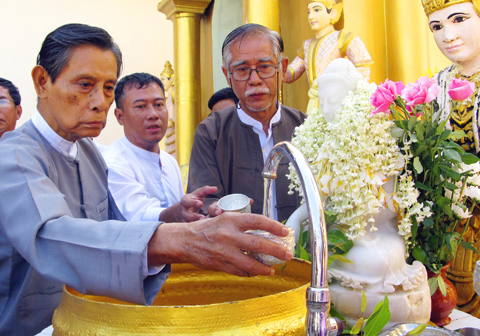Aung San Suu Kyi’s deputy urged Myanmar’s ruling junta yesterday to engage the opposition in dialogue before elections this year, as he took his first steps outside as a free man in seven years.
Tin Oo, 83, vice chairman of Aung San Suu Kyi’s National League for Democracy (NLD), made the appeal as he prayed at Yangon’s famed Shwedagon Pagoda following his release from house arrest late on Saturday.
“Because I am a Buddhist I came here to wish for peace for all Myanmar people,” he said as he toured the huge golden monument, accompanied by his wife and a dozen NLD officials who held umbrellas to protect him from the sun.

PHOTO: AP
“My feeling now is that I wish to find a way through successful dialogue that the whole country can live unitedly and peacefully,” he said.
However, he said his own release means nothing if Nobel Peace laureate Aung San Suu Kyi, 64, and some 2,100 other political prisoners are still detained when the elections take place.
Tin Oo had been held since 2003, when he and Aung San Suu Kyi were arrested after a pro-junta mob attacked their motorcade during a political tour, killing 70 people.
He was a former army general and defense minister who was forced into retirement in the 1970s after falling foul of the country’s military rulers. He was in trouble again in the 1990s because of his involvement with the NLD.
“How can I be glad [that I am free] when there are so many who have been sentenced to life imprisonment? It is not enough to release me alone,” Tin Oo said.
“All people will be happy if all things can be discussed and a solution can be reached,” he said.
He said on Saturday that the government had warned him not to take actions that could “disturb the building of the state” but that he would continue his political activities and visit the offices of the NLD today.
Tin Oo’s release comes with the UN human rights envoy for Myanmar, Tomas Ojea Quintana, due to visit the country today to examine its progress.

People can preregister to receive their NT$10,000 (US$325) cash distributed from the central government on Nov. 5 after President William Lai (賴清德) yesterday signed the Special Budget for Strengthening Economic, Social and National Security Resilience, the Executive Yuan told a news conference last night. The special budget, passed by the Legislative Yuan on Friday last week with a cash handout budget of NT$236 billion, was officially submitted to the Executive Yuan and the Presidential Office yesterday afternoon. People can register through the official Web site at https://10000.gov.tw to have the funds deposited into their bank accounts, withdraw the funds at automated teller

PEACE AND STABILITY: Maintaining the cross-strait ‘status quo’ has long been the government’s position, the Ministry of Foreign Affairs said Taiwan is committed to maintaining the cross-strait “status quo” and seeks no escalation of tensions, the Ministry of Foreign Affairs (MOFA) said yesterday, rebutting a Time magazine opinion piece that described President William Lai (賴清德) as a “reckless leader.” The article, titled “The US Must Beware of Taiwan’s Reckless Leader,” was written by Lyle Goldstein, director of the Asia Program at the Washington-based Defense Priorities think tank. Goldstein wrote that Taiwan is “the world’s most dangerous flashpoint” amid ongoing conflicts in the Middle East and Russia’s invasion of Ukraine. He said that the situation in the Taiwan Strait has become less stable

REASSURANCE: The US said Taiwan’s interests would not be harmed during the talk and that it remains steadfast in its support for the nation, the foreign minister said US President Donald Trump on Friday said he would bring up Taiwan with Chinese President Xi Jinping (習近平) during a meeting on the sidelines of the APEC Summit in South Korea this week. “I will be talking about Taiwan [with Xi],” Trump told reporters before he departed for his trip to Asia, adding that he had “a lot of respect for Taiwan.” “We have a lot to talk about with President Xi, and he has a lot to talk about with us. I think we’ll have a good meeting,” Trump said. Taiwan has long been a contentious issue between the US and China.

Japanese Prime Minister Sanae Takaichi yesterday lavished US President Donald Trump with praise and vows of a “golden age” of ties on his visit to Tokyo, before inking a deal with Washington aimed at securing critical minerals. Takaichi — Japan’s first female prime minister — pulled out all the stops for Trump in her opening test on the international stage and even announced that she would nominate him for a Nobel Peace Prize, the White House said. Trump has become increasingly focused on the Nobel since his return to power in January and claims to have ended several conflicts around the world,